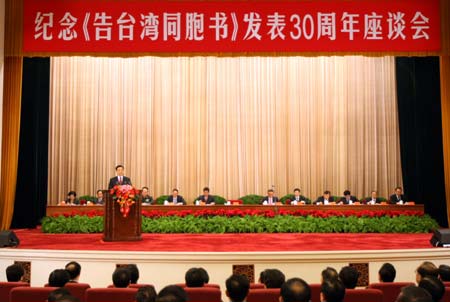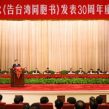
Hu Jintao’s ‘Six-Points’ Proposition to Taiwan
Publication: China Brief Volume: 9 Issue: 1
By:

On the eve of 2009, the President of the People’s Republic of China and General Secretary of the Chinese Communist Party (CCP) Central Committee, Hu Jintao, delivered a capstone speech commemorating the 30th anniversary of the "Message to Compatriots in Taiwan" (Xinhua News Agency, December 31, 2008). The message was first issued by the Standing Committee of the National People’s Congress (NPC) on January 1, 1979, which marked the Communist party’s ‘abandonment’ of its pledge for the ‘armed liberation’ (wuli jiefang) of Taiwan to the island’s ‘peaceful liberation’ (heping jiefang). The 1979 message was the CCP’s first appeal to the Kuomintang (KMT) on Taiwan for an end to hostile confrontation and tension across the Taiwan Strait, and marked the beginning of Beijing’s ‘peaceful unification’ (heping tongyi) strategy. Thirty years later, Hu’s commemorative speech, which coincided with the country’s 30th anniversary of opening up and economic reform spearheaded by the late patriarch, Deng Xiaoping, included a six-point proposal that Chinese analysts and official media are waxing lyrical with praise, calling it a harbinger for peace in the Taiwan Strait (Xinhua News Agency, January 7).
The ‘six-points’ outlined in Hu’s speech are: "1) firm adherence to the ‘one China’ principle; 2) strengthening commercial ties, including negotiating an economic cooperation agreement; 3) promoting personnel exchanges; 4) stressing common cultural links between the two sides; 5) allowing Taiwan’s ‘reasonable’ participation in global organizations and 6) negotiating a peace agreement" (Straits Times, January 2).
According to Yu Keli, director of the Institute of Taiwan Studies at the Chinese Academy of Social Sciences (CASS), Hu’s ‘six-points’ will serve as the "guiding blueprint" for the future ‘peaceful development’ (heping fazhan) of cross-Strait relations. Yu said that Hu’s message demonstrates the determination of his administration’s pursuit for a full normalization of relations across the Taiwan Strait. Without barring sensitive political and military issues, the objective of Hu’s ‘six-points’ is to bring an end to cross-Strait hostility and the so-called "state of civil war" (neizhan zhuangtai). Yu is widely referred to in the Chinese media as the leading authority on Taiwan affairs in the world of China’s government think-tank and academic institutions (China Times, January 2).
Indeed, Hu’s speech represents the first public attempt by the current Chinese administration to directly appeal to the Democratic Progressive Party (DPP)—the current opposition party in Taiwan and one that Beijing has refused to deal with while it was in power from 2000 to 2008. Hu called on the DPP to accept the “One China” principle and “change” its pro-independence stance. The symbolic gesture, which was quickly rejected by DPP Chairwoman Tsai Ing-wen, is widely seen as a non-starter. Tsai said that Hu’s "demand that a political party must first abandon its main principles as a precondition for interaction is not in accord with democratic principles" (Taiwan News, January 1). Hu’s direct appeal to the DPP, however, may indicate Beijing’s concern over the Ma administration’s flagging approval rating since assuming office last May. In the latest survey released by the Global Views Survey Research Center in late December 2008, Ma’s approval rating was hovering around 30.3 percent (Global Views, December 23, 2008). "It is not enough that there is mutual trust between the Mainland and the Kuomintang and Ma Ying-jeou," Yu said, "since there is political party transition in Taiwan, the Mainland must consider the entire spectrum of Taiwanese society" (China Times, January 2).
Notably absent in Hu’s speech was any mention of the KMT’s oft-stated position that the resumption of cross-Strait negotiations is based on the so-called "1992 Consensus" (jiuer gongshi) that both sides agree there is "One China" with each side having different interpretation of what "One China" means. Yet in Hu’s speech there was only reference to "One China" and no “Different Interpretation” (gebiao). This puts the Ma administration between a rock and a hard place, on the one hand Ma wants to keep the positive momentum, but on the other hand Hu’s omission of “Different Interpretations” negates the value of the “1992 Consensus,” which was the justification that the KMT used to engage in cross-Strait negotiations while maintaining Taiwanese sovereignty. The CCP and KMT appear to be looking in the same direction, but they are currently on different tracks. Ma’s dilemma was reflected in the president’s response to Hu’s speech. Speaking at a meeting with U.S. analysts, Ma said that "We have on one hand made an initial response, and on the other hand hope to learn more about the connotations of the overture in China’s (Taiwan) policy" (Central News Agency, January 6).
Li Jiaquan, a senior research fellow at the Institute of Taiwan Studies at CASS and conservative commentator on Taiwan affairs, published an article in the Hong Kong- based newspaper Wen Wei Pao. Li says that Hu’s speech is a significant milestone in cross-Strait relations and signals the third strategic adjustment in the Mainland’s policy toward Taiwan in the past three decades. Li identified these adjustments as: the shift in the mainland’s policy from ‘armed liberation’ to ‘peaceful liberation’ before 1979; the subsequent shift from ‘peaceful liberation’ to ‘peaceful unification’; and finally Hu’s speech that has moved beyond ‘peaceful unification’ to ‘peaceful development’ (Chinareviewnews.com, January 2).
A former secretary general of Taiwan’s National Security Council, Ding Yu-zhou, who is a decorated field commander as well as head of the Military Intelligence Bureau (J-2), agrees with Yu’s earlier assessment of the significance of Hu’s speech, saying that Hu’s ‘six-points’ will serve as the CCP’s "strategic guiding principles" toward Taiwan (China Times, January 2). According to Ding, the biggest stumbling block in cross-Strait relations is the issue of sovereignty, on this issue Hu Jintao will not give an inch, and there can be no short term solution so the two sides should shelve political disputes. However, with his most recent message Hu has put political issues on the negotiating table and Ma Ying-jeou will have to make a tactical decision of continuing his administration’s current policy of putting “economics ahead of politics” or of placing political and economic negotiation on parallel tracks. Ding added that it is too early to determine whether or not Hu’s ‘six-points’ represents China’s goodwill toward Taiwan. Ding believes that the litmus test will be in Beijing’s response to Taiwan’s entry as an observer to the World Health Assembly (WHA) and its bid to enter the UN. He said that if the CCP really wants to demonstrate goodwill toward Taiwan, the PRC should take the initiative by releasing captured Taiwanese intelligence officers (China Times, January 2)—an issue that Ding has urged President Ma to put on the negotiation agenda (China Times, January 2).
Contrary to the general assessment of mainstream media in Chinese and Western press, Tung Li-wen, a public security professor at the Central Police University, said that Hu’s ‘hardline’ speech is a blow to the Ma administration’s current China strategy (Liberty Times [Taiwan], January 1). Tung pointed out that Hu’s speech revealed what the PRC means by the ‘reunification of China’ (zhongguo tongyi)—that is unification under of the People’s Republic of China. He added that the speech was aimed at the KMT and is pressuring the Ma administration to fast-track negotiations for political reunification under the "One China" principle. Moreover, he pointed out that since Jiang Zemin’s visit to the United States in 1997, there was a tacit understanding from the Chinese side that the United States has a definite and influential role in the Taiwan Strait. However, Hu’s speech resuscitated an old slogan that "The Taiwan issue is purely China’s internal affairs. No foreign country is allowed to interfere," which Tung suggested is a veiled message meant for the incoming U.S. administration (Liberty Times [Taiwan], January 1).





